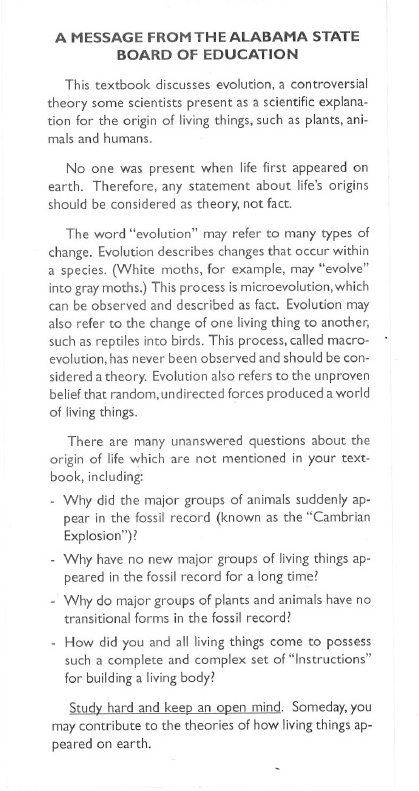
When the Alabama state board of education voted to approve a new set of science standards on September 10, 2015, in which evolution was described—correctly—as “substantiated with much direct and indirect evidence,” I immediately wondered what would become of the evolution disclaimers that textbooks in the state have been required to carry through the last nineteen years. There have been three versions of the disclaimer, in 1996, 2001, and 2005. The 1996 version (right) was the most egregious, describing evolution as “a controversial theory some scientists present as a scientific explanation for the origin of living things.” There was a fair amount of coverage of the prospective fate of the disclaimer, including articles in the Washington Post and Newsweek, but I didn’t see anything about the genesis—if you will—of the original disclaimer.
The moving force was Norris Anderson. A former biology teacher who founded Cornerstone, a Christian ministry in Alabama, Anderson was serving on the Alabama state textbook committee in 1995, and argued that the science textbooks submitted for consideration failed to comport with the new state science standards by presenting evolution dogmatically. His solution, adopted by the state board of education, was to paste a disclaimer inside all biology textbooks. Of course, the disclaimer was widely criticized—memorably and devastatingly by Richard Dawkins. But even the state’s newspaper editorial columns questioned the wisdom of the disclaimer. The Mobile Press-Register asked, “Must we now portray Alabama as a state that mocks science, confuses its children, insults its teachers[,] and trivializes religious faith?”
Anderson’s “The Alabama Insert: A Call for Impartial Science” defended the disclaimer in detail. With respect to the disclaimer’s claim, “Evolution also refers to the unproven belief that random, undirected forces produced a world of living things,” Anderson explained that the claim was included to warn students that textbooks present atheism in the guise of science. “Statements such as ‘evolution works without either plan or purpose’ illustrate that Darwinism is a theory with explicitly anti-theistic implications. Clearly, those who promote Darwinianism as fact have a theological ax to grind.” He then presented as evidence of the last assertion this passage, attributed to Eugenie C. Scott’s article “Monkey Business,” published in 1996: “… the material world is all that exists … there is nothing supernatural, no God or gods, no creator, no creation.”
Even as creationist misrepresentations of scientists go, Anderson’s misleading quotation is extraordinarily crude. What Scott wrote was, “Philosophical naturalism asserts that the material world is all that exists—that there is nothing supernatural, no God or gods, no creator, no creation” (emphasis in the original; words omitted by Anderson in boldface). Clearly Scott was not advocating philosophical naturalism but only describing it. In context, she was describing it in order to contrast it with methodological naturalism and to argue that methodological naturalism is recognized as a necessary constraint on scientific investigation by scientists of all faiths and of none. She added, “My own position is that advocating a nontheistic philosophy [such as philosophical naturalism] in the science classroom is just as wrong and just as unscientific as advocating creationism is.”
“Monkey Business” contains the full text of the disclaimer, describing it as “pernicious”; surely Anderson would have read the article he cited. So it’s hard to avoid the conclusion that Anderson was intentionally misrepresenting Scott when he omitted the words from her sentence, making it seem as though she were advocating rather than describing philosophical naturalism. On the other hand, Casey Luskin, currently a staff member at the Discovery Institute’s Center for Science and Culture, the de facto institutional headquarters of “intelligent design” creationism, may have simply copied it mindlessly from Anderson when he included it in a collection of “Philosophy quotes” on the website of the Intelligent Design and Evolution Awareness Center, a side project of his which appears to have become moribund by late 2008.
Not all of the claims of “The Alabama Insert: A Call for Impartial Science” are quite so blatantly wrong, and—nineteen years later—it’s perhaps not the most rewarding endeavor to debunk it systematically. The disclaimer that it inspired was removed in 2001, replaced by a disclaimer that described evolution by natural selection as controversial and expressed skepticism of its ability to produce “large” evolutionary changes. That was in turn removed in 2005 and replaced by a disclaimer that retained the skepticism of the power of natural selection but omitted the description of it as controversial. But now that the state science standards treat evolution more or less adequately, there is no conceivable rationale to retain any version of the disclaimer. As the Montgomery Advertiser editorialized, “It’s time to rip off the stickers.”

